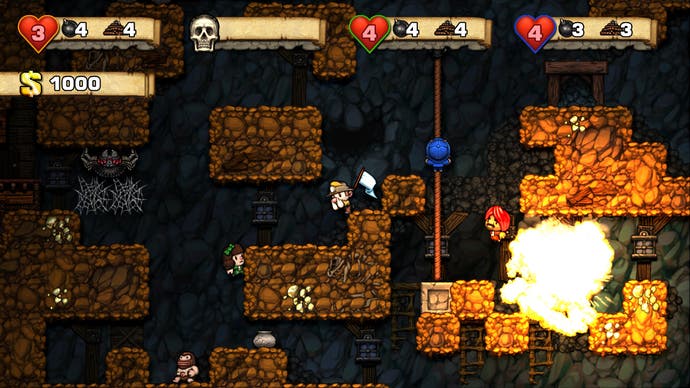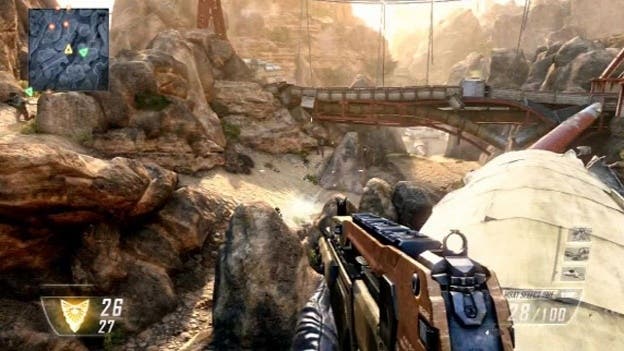Saturday Soapbox: Hard times are here again
And that's a very, very good thing argues Jon Denton.
It's been said in the past that Gears Of War is the most referenced game in all of videogames journalism, thanks to its tenets of cover, carnage and meat-headed chunkiness. I've been scouring the four corners of the globe's games writing in the past year, though, and I'd wager it's been replaced. Barely an article slides through a printing press or CMS back-end without the words Dark and Souls appearing next to each other at some point during the body copy.
From Software's peerless sequel has conjured up a new type of language; one of challenge and conquest, of battle scars and of faint triumph. Even those who haven't set foot in its world of disquiet use it as a touchstone for anything truly difficult. And that's the key, really. Dark Souls is a vastly intelligent videogame.
Anything can be stupidly difficult, anything can lower HP and boost enemy damage, but it takes skill, precision and a dedication to a specific style to create something like Dark Souls. But that supposed small 'hardcore' audience isn't as small as some might think. Just look around; it isn't just Dark Souls that is scratching that special kind of itch.
Look at FTL, Spelunky, Super Meat Boy or Trials Evolution. Their success both critically and commercial shows that gamers are fed up with having their hands held. Human beings like to be challenged; to overcome adversity. And gaming is finally remembering that.
Take the two big releases from two weeks ago. Many would argue that games as esoteric and downright difficult as Dishonored and XCOM would struggle in the modern day triple-A market. Well, we can't truly know the success of either of those games until future financial reports surface, but high chart positions, rabid fan reaction on social media and glowing reviews suggest they've done pretty well for themselves.

It's not the out-and-out 'trickiness' of these games that have proved so appealing though. It's more than that. Dishonored is not a traditionally 'hard' game. If you're an idiot, you can indeed blast through it in four or five hours. Played properly, or in the proper spirit at least, it's a game that's actually as hard as you make it. A world that is open in scope and possibility, and one that lets you express yourself within its parameters. Yes, killing each mark is the traditional barometer of success, but the amount of restarts I had on just the first mission alone suggests it's about much more than that. I wanted to accomplish Dishonored in my own way. That's the true challenge.
Firaxis' buoyant remake of XCOM is genuinely tough, but again it's about more than just the battle. It's a game about thought, calculation and process, blended expertly with enough bravado and raw drama to elevate it above the algorithms and formulae humming underneath the hood. Just like Dark Souls, it's not the raw difficulty that holds appeal, but the sense of achievement that's borne out of using our minds and our skills to flourish and prevail. The magic of games like these is that failure is often just as cathartic as victory - after all, we learn so much more about ourselves in defeat.
And then there's the wonderful Hotline Miami. And upon delving into its 8-bit world of drug-hazed depravity and sensational ultra-violence, I find another work that fits into this formula - a game that is stupendously tough, yes, but something every bit as cerebral and rewarding as it is damningly difficult. It's an almost perfect example of this modern gaming challenge; not one borne out of the frustration and coin-harvesting of the arcade model, but one that comes from a place of a genuine understanding and execution of videogame design. Hotline Miami takes the successes of gaming's history and marries it to progressive ideas. Not bad for something that looks like it could run on a Game Boy Color.
It's not just the realm of the indie or the esoteric, either. Even the actual appeal of FIFA and COD is far less base than some might think. For all its mainstream trappings, tabloid-fuelling nonsense and conversation-stilting omniscience, football is actually a deeply complex and tactical pursuit. Removed from the physicality of real-world football, FIFA distils the rapid-fire planning and spatial awareness of the sport into an accessible and immediate format. FIFA players might not know it, but they're dedicating countless hours in the pursuit of excellence in one of the most complex games on the market.

Call Of Duty, too, is misunderstood. Looking at what actually makes the games popular (and you need look no further than the likes of Syndicate and Ali-A's YouTube channels for proof); and it's not the rollercoaster campaigns, no matter how good they might look in cinema ads and in website rollovers.
It's the high-speed tactical intricacy of its multiplayer. For many, watching guys like Sandy Ravage and the aforementioned British YouTube duo is like a martial artist obsessing over Roger Gracie or even Bruce Lee. As daft as it might sound, for those that find Call Of Duty important - and there are millions who do - these games offer a chance for self- improvement through dedication.
So ultimately, this era of soft, handholding experiences was never going to last. Yes, whistling through the pretty sights and getting suckered in by pyrotechnics has its appeal, unquestionably, but there's only so long that skin-deep beauty can ever last. Just look at serial travellers. The beautiful coasts and historic monuments only ever seem to hold their interest for a finite amount of time. How long before they're trekking through the Amazon or hiking Machu Picchu?
How long before we're fed up with being mollycoddled and want some excitement back in our lives? I think it's already happening. Now if you'll excuse me, I left my owl mask around here somewhere and I've got work to do.

